Highlights - April 2024
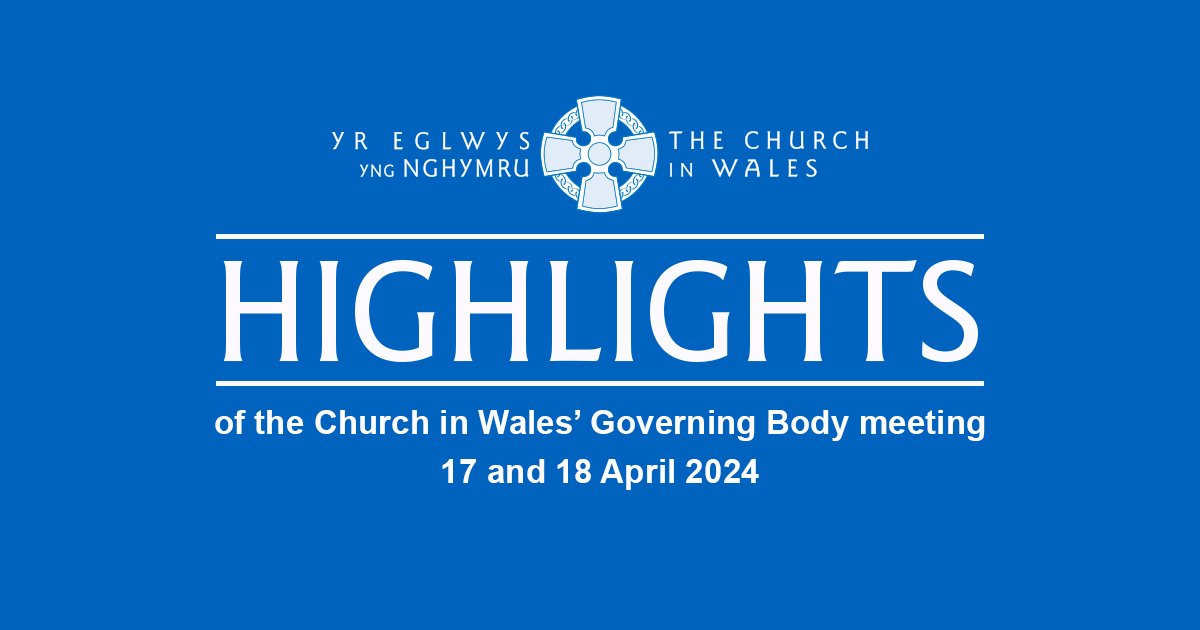
Members of the Church in Wales’ Governing Body met at the International Convention Centre Wales in Newport, on April 17-18. The meeting was live-streamed and you can watch the recordings of each session, together with a short summary, below.
Worship
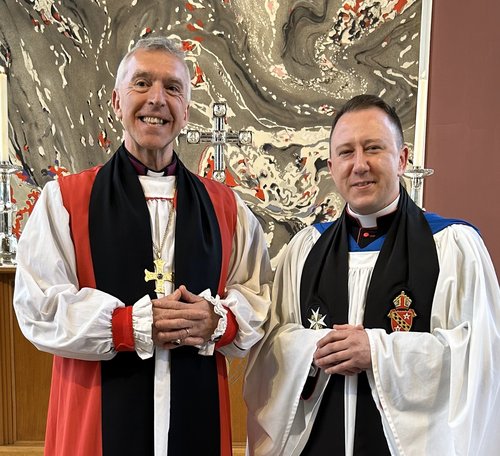
The Archbishop presided at the opening Eucharist. Evening Prayer was held at Newport Cathedral during which the Sacred Synod took place to confirm the appointment of Canon David Morris as Assistant Bishop of Bangor (pictured). The Dean of Newport, Ian Black, presided and the Bishop of Llandaff, Mary Stallard, preached. Morning worship was led by Canon Ian Loynd.
Daily Sessions
- Welcome to visitors
- Presidential Address
- Standing Committee report
- Launch of Daily With God
- Question Time
- Legal and Governance report
- Representative Body report
- Net Zero update
- Bench of Bishops report
- Restoring Welsh Waterways presentation
- St Padarn's report
- Private Members Motion
- Farewells
- Next meeting
- President's Charge
Session One
Welcome to visitors
The Archbishop welcomed representatives from other churches and organisations. These were:
- Cytûn & the Covenanted Churches in Wales: the Revd Sion Brynach (Chief Executive) and the Revd Gethin Rhys (Policy Officer)
- United Society for the Propagation of the Gospel: Carol Miller (Church Engagement Manager)
- Union of Welsh Independents: the Revd Jeff Williams (President)
- Christian Aid Cymru: Mari McNeill (Head), Rebecca Elliott, (Education and Youth Officer, Wales)
Presidential Address
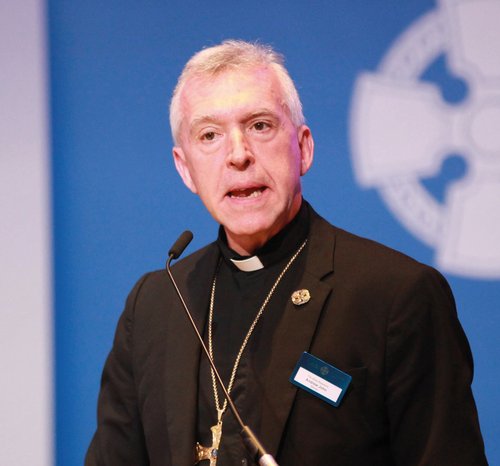
The Archbishop called for a halt to the “indefensible abuse” of our waterways in his Presidential Address.
Rivers, he said, were dying because of pollution and he called on people to pay their part in addressing the crisis. The pollution of Welsh rivers will be the focus of a summit, Restoring Welsh Rivers, which the Archbishop, Andrew John, is convening in November.
It was, he said, the role of the Church to speak out on issues of fairness and justice, he said.
“As we serve those around us, we do so as Christians. We are not an NGO nor an arm of government. We are compelled to speak out on issues where we believe something is out of place."
Archbishop Andrew’s keynote address also looked at how the Church in Wales could grow and thrive in an uncertain landscape. He related principles outlined by Professor John Kay and Lord Mervyn King in their book, Radical Uncertainty, to the future of the Church.
The Archbishop praised the Church’s role in national events and paid tribute to the work of clergy and lay ministers. For the Church to flourish, it needed to develop and grow, said Archbishop Andrew. That meant adapting to change and learning from each other’s experiences.
We are compelled to speak out on issues where we believe something is out of place
Change would focus on the operation of Ministry and Mission Areas – the larger geographical units which are now the Church’s primary local groupings. Important lessons were emerging from them, such as their potential for wider reach and bigger projects, team-working to make the most of the ministry of all, not just the clergy, and their courage in taking risks and being willing to make mistakes.
Collecting and analysing data in areas including investment, membership and carbon emissions, was another important aspect of growth, he said. It was also about being curious and prepared to evolve.
However, the Archbishop concluded that the most important part of the Church’s strategy was its prayerfulness and shared faith in Christ. Healthy churches, he said, needed to be “robust in the ancient spiritual disciplines”. He pointed to the BBC’s latest Pilgrimage series, which followed celebrities on the North Wales Pilgrim Way, as an example of a renewed interest in spirituality.
“We need to give ourselves constantly to the love and to the practice of Jesus Christ, becoming authentic, forgiving and hopeful people with something worth sharing.”
Members were given the opportunity to respond to the Archbishop’s address.
Session Two
Standing Committee report
Tim Llewelyn, chair of the Standing Committee, delivered its report, including the final report from the Monmouth Review Implementation Group.
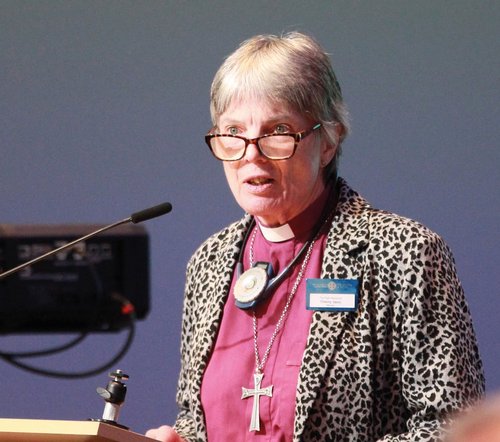
The Bishop of Monmouth, Cherry Vann, (pictured) said the Monmouth Review group had done a “significant piece of work which would go a long way to address the problems”. She assured members that the report recommendations had been responded to and that positive changes in the Bench had taken place. The challenge, she said, was continually paying attention to the culture of our organization so that what happened could not happen again.
“We will need continually to pay attention to the culture of our organization, to challenge one another and take responsibility ourselves for our own attitudes and behaviours and how things are done here.”
Bishop Cherry also highlighted the need to encourage women as leaders provincially and echoed calls for openness and transparency in the appointments process.
Responding, Mr Llewelyn emphasized that ongoing oversight was important and the Standing Committee would continue to do that.
The report’s recommendations were moved.
Launch of Daily With God prayer manual
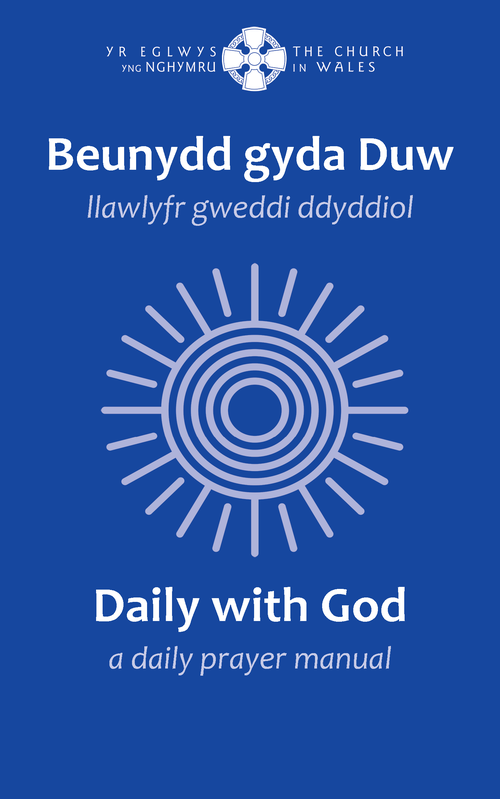
A prayer booklet that the Bishop of St Asaph, Gregory Cameron, used to read on his 20-minute journey to school, 50 years ago, was the inspiration behind the Church’s new manual.
Launching Daily With God, Bishop Gregory said it provided the “well-trodden prayer of our Christian inheritance” in a portable form. It included short forms for morning, evening and night prayer, key texts for our faith, a suggested cycle of prayer for the week and a basic weekly lectionary. There were also prayers for every season and a wealth of original Welsh material.
“It is a rich resource and authentically something that belongs to the Church in Wales,” he said. “I believe it is an invaluable text and I commend it to you.”
Session Three
Question Time
There were 10 questions. You can download them and the answers given here
Legal and Governance report
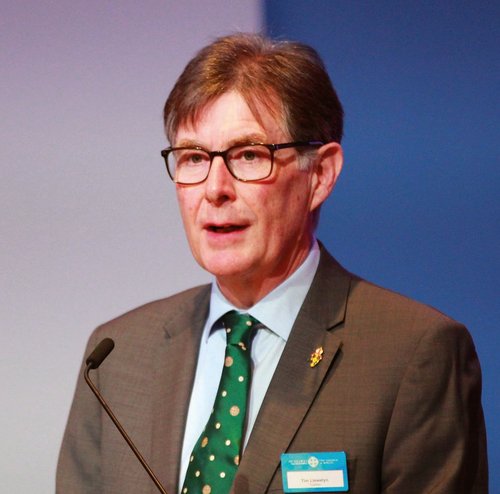
Two changes to the Constitution were carried. One related to cathedral canons to make it clear that bishops could appoint Honorary Lay Canons and Ecumenical Canons. The second related to improvements to the holding of the Archbishop’s Registrar’s List.
The report, which was introduced by Tim Llewelyn (pictured), chair of the Standing Committee, was approved.
Session Four
Representative Body report
Real opportunities for growth were the focus of the Church Growth Fund, said Professor Medwin Hughes, chair of the RB, presenting the report. The Fund, which takes over from the Evangelism Fund, had £100M for projects over the next 10 years. So far, two Tier One applications (those below £10,000) had been approved while two Tier Two applications were under consideration.
“We are on a journey,” said Professor Hughes. “Not all the projects will work but that is alright – we will learn from that and reflect. We are focusing on real opportunities for growth.”
The motion to accept the report was passed.
Net zero update
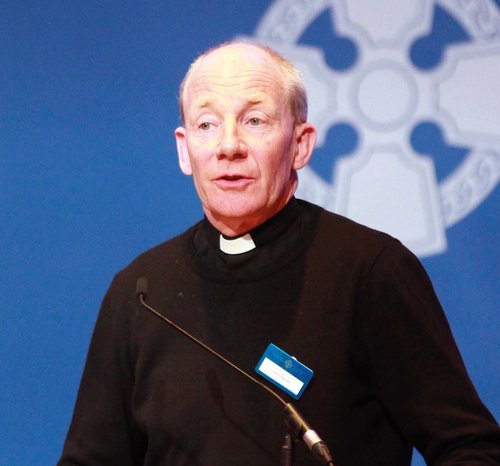
With only one-fifth of churches having done the Energy Footprint Tool, there was some distance to go to reach the Church’s aim being net zero by 2030, said Canon Justin Davies (pictured), chair of the Climate Change Hub.
Presenting the update, Canon Justin said an additional way of collecting data was being explored, combined with a study of possible collective green energy procurement. Options for a single green energy tariff for all our buildings were being looked into with the energy broker 2Buy2 and a fully detailed proposal would be brought to members in September.
“Our targets are exciting but ambitious,” he said. “Our churches are facing big challenges so it is important to find new and fast ways to reduce our emissions to their lowest level. Green energy purchasing and targeting high emission buildings are the way forward.”
Bench of Bishops report
Plans for a provincial Advent course and Church in Wales email address for all clergy were highlighted by the Bishop of Swansea and Brecon, John Lomas, presenting the report.
The online course for Advent would have six sessions, presented by the bishops, on the gospels.
The Bench was also supporting proposed changes to the discernment framework. These were supported by Caroline Woollard, chair of the Provincial Discernment Panel, who said the changes would make the process more inclusive and shared.
“The perception is that it is a hurdle you have to get through, rather than part of a process,” she said. “Coming to panel isn’t a rubber-stamping process. Our advice, is just that – advice. It is the bishops who make the final decision on whether people go forward for ordination or not …We hope the new process will help grow a culture of openness and discernment, whatever stage we are at.”
Session Five
Restoring Welsh waterways presentation
The crisis facing Wales’ rivers and waterways was the focus of a presentation introduced by the Archbishop.
The issue would be the focus of a summit, hosted by the Church in Wales, in November, he said. Outlining the problem and addressing the challenges, was the first step towards taking action to solve them.
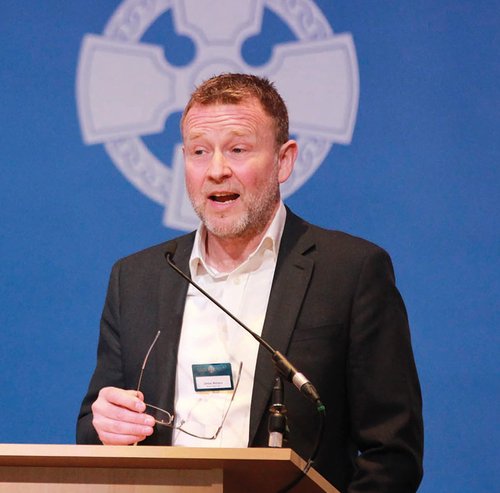
James Wallace, CEO of River Action, and Dr Christian Dunn, Associate Director of the Bangor Wetlands Group, Bangor University, both give a presentation on their work and the scale of the crisis as they saw it.
Mr Wallace (pictured) thanked the Archbishop for his leadership and “visionary foresight” on the issue, saying “it is exactly what we need right now”. The key was for all agencies to work together to tackle the problem and the Church in Wales was in a unique position to drive the agenda forward.
He urged members to take the call to action to save Welsh rivers back to their communities. “We are in a freshwater emergency and need to act with urgency,” he said.
Members responded with passion and enthusiasm.
Session Six
St Padarn’s report
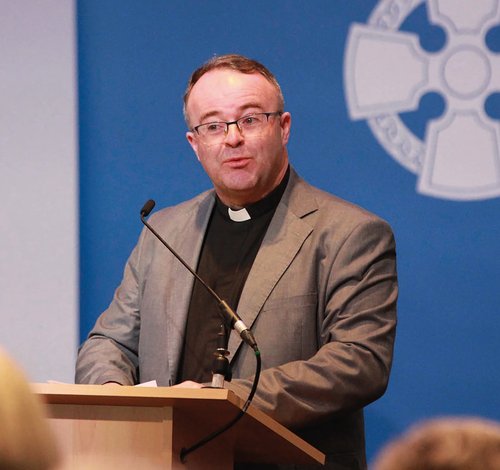
Listening, reset and reorientation were the key themes of the year, said Canon Prof Jeremy Duff (pictured) presenting the annual report.
A process of engagement with the bishops had led to St Padarn’s being recommissioned as the Church’s institute for formation, education, ministerial development and research with a new strategic direction for the next six years.
There had also been a thorough evaluation of the institute through a Periodic External Review. “This affirmed much of the culture, spirituality and formational excellence of the institution while giving a host of recommendations,” he said.
The motion to note the report was carried unanimously.
Session Seven
Private Members’ Motion
A proposal to ensure more rest time for clergy by amending the work/life balance and holiday allowance in the Terms of Service was brought forward by the Revd Kate O’Sullivan (pictured).
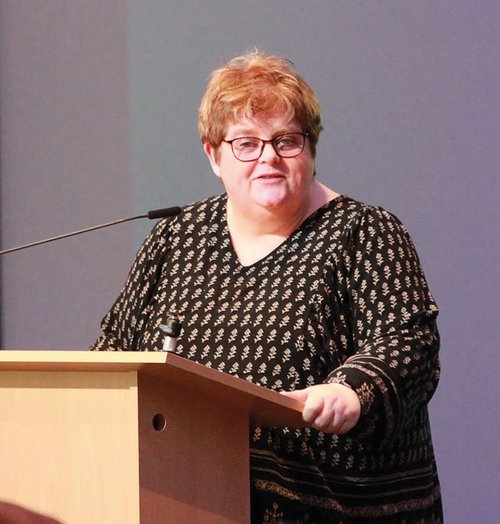
She suggested a work-free period of 48 hours once a month and two periods of seven, rather than the current six days holiday after Christmas and Easter.
“The aim is to begin a change of culture, to take good care of our assets – our clergy – to make our ministry sustainable,” she said.
The motion was seconded by Ian Loynd who stood in for the Revd Gareth Rayner-Williams. “We must reduce the pressure on those who work hardest to look after us and be a better example to those that we serve,” he said.
The motion prompted a great deal of discussion and suggested amendments by members. Eventually, Bishop Gregory proposed a procedural motion to end the motion without a vote to give the Bench time to consider the issue properly.
“The Bench is broadly in favour of the substantive motion and amendments,” he said. “But concerned that if we make this decision today we are in danger of acting in haste and, with unintended consequences, repenting in leisure.”
As Bishop holding the portfolio for HR issues, Bishop Gregory assured members he would work hard to enable a report to be prepared for September’s meeting. Then he moved to next business, invoking Standing Order 11.
Members voted 63 for, 31 against, with no abstentions, to move to next business.
Farewells
The Archbishop paid tribute to the Dean of Brecon, Dr Paul Shackerley, who had stood down as secretary to the Provincial Discernment Panel after many years to focus on his work as Dean, and to the Dean of Llandaff, Richard Peers, who was retiring. He thanked them both for their service.
Next meeting
The Governing Body will next meet on September 4-5 at the University of Wales, Trinity Saint David, in Lampeter.
President’s Charge
“We have embraced and committed ourselves to be God’s church.
The Archbishop urged members to be “alive to God and alive to the world”.
Referring to challenges faced by Christians in other countries due to war, violence and climate change, he said, “We live in an extraordinary world and hear extraordinary stories. The challenge is for us to embrace these challenges with the same attitude as others.
“We have embraced and committed ourselves to be God’s church. We have heard reports of how formation lies at heart of all called, embraced a new bishop, provided a new resource book of prayer - in all of these things we have committed ourselves to being god’s church. That is a church that exists not for itself but for Him.”